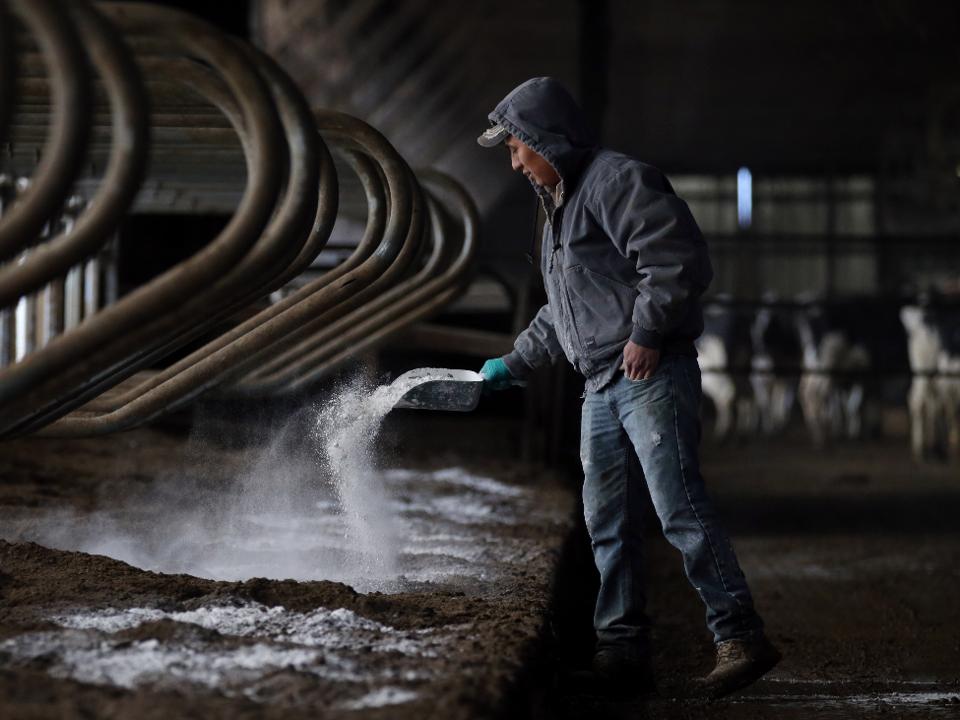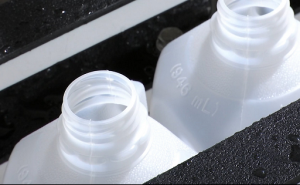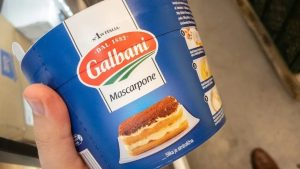
On Tuesday, a coalition of labor organizations, including SEIU Local 32BJ, the Workers’ Center of Central New York, the Worker Justice Center of New York, and the AFL-CIO’s Farm Labor Organizing Committee, sent an open letter to Chobani asking for a commitment to support union organizing rights in the dairy industry, and among farm workers generally.
“Chobani has a reputation as a high-road company,” the group wrote to founder and CEO Hamdi Ulukaya, who started the New York State firm in 2005. “You’ve pledged support for improving the lives of farm workers. Yet, today, many dairy farm workers live in substandard, squalid housing … Worker injuries are commonplace [and they] receive little or no safety training.”
In the dairy industry, like other areas of food production, it can be difficult to know exactly which farm has supplied which company, as there’s usually a ‘middle man.’ Chobani gets its milk through the cooperative Dairy Farmers of America (DFA), which sources from thousands of different farms, but the firm has committed to using DFA milk that is sourced locally to its facilities.
In dairy, like many areas of farming, workers also consistently face unsafe working and/or living conditions, unfair pay and extra costs, and other serious issues on which their voices aren’t heard. They’re mainly migrants or immigrants, often undocumented, and may live on-site in company housing (such as repurposed or in-use farm buildings) under company control.
Such is the case in New York’s dairy industry, which is composed of many smaller dairy farms (vs. the bigger ones in states like California, Wisconsin, and Idaho), where a mostly Spanish-speaking immigrant workforce often lives in sub-standard housing at isolated farms working 80+ hours a week for under minimum wage, according to labor advocates as well as current and former workers.
Some workers say they’ve also been forced to pay for equipment like extra-long latex gloves, or been harassed by farm owners when they’ve attempted to organize a union.
Labor advocate and former dairy worker Crispin Hernandez, who said he was fired by a New York farm and DFA supplier for trying to organize his coworkers with help from Rebecca Fuentes of the Workers’ Center of Central New York, said that before he was fired, the owner’s son called the police on one such meeting, frightening away undocumented workers.
On another occasion, a supervisor “violently” ejected a coworker from their work area after he’d been ordered, exhausted, to begin work on his day off.
Hernandez, who helped to pass a new state law allowing farm workers to organize unions, and mandating overtime pay above 60 hours a week, starting in 2020, recalled in a phone interview how scared he was about joining New York’s dairy industry even before he moved there, like so many others, out of financial necessity.
Just before he was set to leave Mexico in 2012, he said, the body of another upstate New York dairy worker, a man named Genaro, was being repatriated to their mutual home state of Oaxaca. In the years that followed, he and Fuentes would both try to find out what had happened to Genaro; in short, Fuentes said, Genaro was training some new arrivals (as workers were expected to do) when an industrial accident occurred.
It wasn’t an isolated incident, either. A 2017 report by the the Workers’ Center of Central New York and the Worker Justice Center of New York found that, between 2006 and 2016, 69 farm workers died while working in New York’s dairy industry.
Between the physical hardships and stagnant-to-low pay, it’s no wonder that NY farm workers – like workers in so many other industries – are turning to unions to improve their situation, said SEIU Local 32BJ vice president Larry Engelstein.
“It’s a perpetual struggle for workers, and I do think it’s why we’re finding today that unions are increasingly popular,” he commented by phone.
“If you look at how often unions have come up in the Democratic primaries, for example, that discussion is giving voice to the incredible anxieties people have that their children can’t have a better future – it’s an important part of the original American ethos, and it’s not happening anymore.”
A few years ago, while they were strategizing ways to hold New York dairy farms to higher standards and divert “union-busting” behavior, Fuentes and her colleagues noticed Chobani on the list of companies that sourced their milk from DFA (and at the time, at least, from the farm that had fired Hernandez).
Given that Chobani “has a reputation of really caring about its plant workers,” Fuentes said, labor advocates decided to ask the company to help address workers’ issues in the state.
Advocates and farm workers say they’ve discussed these issues with Chobani on multiple occasions since 2017, and that the company hadn’t been aware of those problems, but continuously showed concern. In response to their request for a public commitment in support of dairy workers’ right to organize, however, the company has demurred, according to labor advocates.
Chobani presents a different view on the matter, though it says its goals are the same. “We know that dairy farming requires exceptional care and effort, and the people who do this demanding, important work every day, year round, in good weather and bad, deserve to feel protected and supported,” the company said in a statement.
“We absolutely respect their right to organize, and share their commitment to improve worker welfare, safety and legal status. We’re fighting for the same progress – just taking different approaches.”
As one of the dairy industry’s rising stars, Chobani and its founder have frequently been celebrated for a demonstrated desire to improve the business world and larger one.
Ulukaya has described himself as the “anti-CEO,” famously signed over 10% of company shares to employees, and launched campaigns or shown public support for everyone from veterans and refugees to school children with lunch debt (something businesses as well as regular folks nationwide have increasingly offered to do in recent years).
The company has also attempted to address problems in the dairy industry, from working conditions to animal and environmental welfare, with its six-pillared Milk Matters initiative.
One aspect of that campaign, according to the company, is a recently announced partnership with Fair Trade USA (FTUSA), a third-party certification organization, to explore the development of a Fair Trade certification standard for dairy farms.
In their letter to Ulukaya and Chobani, labor organizers called FTUSA’s record “spotty” on respecting workers’ rights to organize, pointing to the certification of a Central American melon farm “with a history of union busting and grave worker exploitation” [PDF].
Like other critics of FTUSA, they also argued by phone that the organization’s effectiveness in improving workers’ pay and quality of life isn’t proven, nor are its audit methods without issue – and that, compared to public support for organized labor from the nation’s most popular yogurt brand, it can’t go nearly as far to ensure their well-being.
On the subject of certification and compliance, FTUSA commented in a statement, “We immediately field complaints and work diligently to address them through enforcement mechanisms.”
Regarding its stance on organized labor, the group wrote, “Fair Trade USA’s [Agricultural Production Standard] – whether applied in the US or internationally – outlines requirements which prohibit interference by employers to the rights of freedom of association and collective bargaining and protects against discrimination or retaliation against trade union members or workers who have attempted to form or join a trade union or other worker organization. FTUSA does not mandate the formation of unions but, through the APS, ensures workers who choose to organize are protected.”
FTUSA also said that it plans to pilot its dairy certification standard in 2020, and is currently “refreshing [its] entire Impact Management System.”
Chobani, whose Milk Matters initiative involves efforts throughout the dairy industry that are in various stages, said that it plans to have the full program up and running by 2025.
In the mean time, Hernandez, Fuentes, and their colleagues hope to continue increasing interest and membership in labor unions within the dairy industry, where vulnerable workers go mostly underrepresented while facilitating a new kind of boom.
In the past decade, the number of US milk farms has declined by about 30%, according to Farm Journal’s MILK Magazine, but across the country, rates of milk production have continued to rise.
New York’s Department of Agriculture [PDF] reported in 2016 that the number of dairy farmers in the state dropped to just over 4,600, with an average gross income of $545,131. Their herds were also smaller, in keeping with national trends, while milk production was still climbing, both in total and per cow.
According to MILK, dairy farms in New York and Idaho – where Chobani’s two production facilities are located – have been vying for third place overall.

























